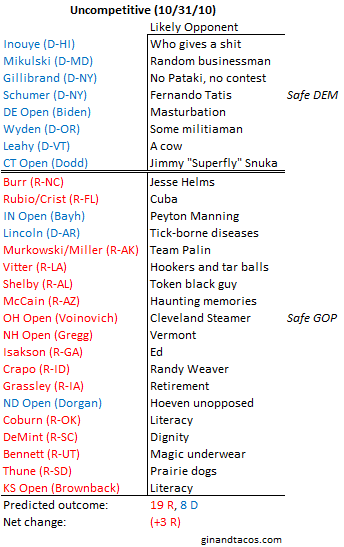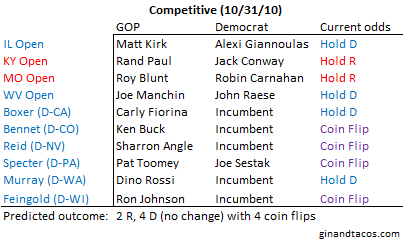As we reach the end of yet another long, grueling circus of a campaign, let us reflect on a few of the larger issues in play on Tuesday before charging into the predictions. (N.B.: I got exactly one Senate race wrong in 2008 and two in 2006, and in both years I was inadvisedly blinded by my hatred of Mitch McConnell and Bob Corker. Past results do not necessarily indicate future performance, but to continue this trend I should get 0 wrong in 2010 and then -2 wrong in 2012.)
The GOP has done a poor job of managing expectations, setting themselves up for defeat even in victory. Do not misunderstand me. I don't mean literal defeat, as in failing to gain seats in both chambers. They are taking the House with 99.5% certainty and they will pick up at least four Senate seats, possibly more. The problem is that their year-long rhetoric and the overwhelming sense of cockiness radiating from the party elite really puts them in a bind. They and their media surrogates have been predicting such an overwhelming, crushing defeat for the Democrats on Tuesday that even a slightly better-than-expected performance by the blue party will read as a GOP defeat. The problem with predicting a 60-seat pickup is that when you "only" pick up 40 it looks like you underachieved. Gaining 40 House seats is really good for one election. But the Democrats would be able to look at a 40-seat loss and say "Is that it? What happened to the tidal wave of Teabaggers we've been hearing about?" In fact, I will be very surprised if the Democratic talking point after Tuesday is anything other than "This hardly looks like the revolution Glenn Beck promised."
Now. On to the races.
I hate House predictions. There are just too many races in play for one person to meaningfully track, analyze, and comment on them. The vast majority of predictions are the GOP gaining between 50 and 55 seats. My poorly-informed guess is that they will underperform that slightly based on the strength of some of the recent generic ballots. Generic ballots are a terrible tool overall, but Alan Abramowitz has done some pretty neat analysis of Gallup's generics over the years suggesting that a 4-6 point advantage for the GOP in generics corresponds to a 44-50 seat pickup in the House. I'll go with the 45-50 range and give Alan the credit if I'm right.
And now the Senate.
First, I've moved four additional races out of the Competitive category since the last update:

Lincoln is toast in Arkansas, and after some initial indications that the races might be somewhat competitive Portman (OH) and Ayotte (NH) have really pulled away from their Democratic rivals. All three of those seats are likely safe R, and of course the surprise nomination of Christine O'Donnell has taken the Delaware race out of play.
That means that of our 37 (!!!) races this year, more than 2/3rds of them – 27 in all – are slam-dunks:

These races represent a 3-seat pickup for the GOP, with the North Dakota, Arkansas, and Indiana races switching parties.
Finally, let's look at (few) the competitive races:

Isn't that something? Only 10 competitive races, and I'm being generous to include two of them (MO and KY). First, let's talk briefly about the six races with solid predictions:
And finally, the four Coin Flip races. I would not bet money on any of these. I would not even bet someone else's money on any of these. They are, with one exception, Too Close to Call in every sense of the phrase. I hate making predictions on these because so much will depend on turnout and the small number of late deciders. These races are close enough for just about any small change to matter.
So if Ed is right, that leaves the GOP with a pickup of five seats. I am probably wrong about Wisconsin, if the poll numbers are to be trusted, but odds that I am wrong about WI are as good as the odds of Reid prevailing in NV so it could be a wash. But my theory is, what fun would it be to make the same predictions as everyone else, just blindly following the polls? I'll go out on a limb and call Feingold an upset winner along with tight Democratic holds in Colorado, Illinois, and Washington.
Final prediction: +5 GOP: 46 R, 52 D (+ 2 Independent Democrats)